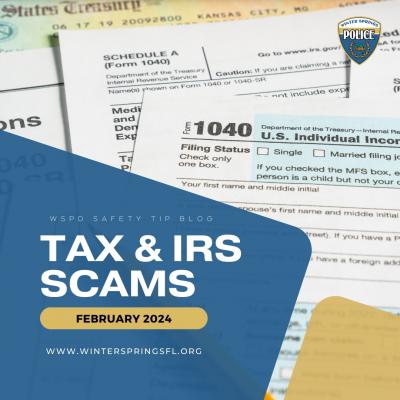February 2024 | Tax & IRS Scams
We have entered the tax season again, which can be an active and lucrative time for scammers. Here is a list of scams you may encounter in this tax season.
-
'We recalculated your tax refund, and you must fill out this form.'
These scam emails display the IRS logo and use subject lines such as "Tax Refund Payment" or "Recalculation of your tax refund payment." It asks people to click a link and provide their Social Security numbers, birthdays, addresses, driver's license numbers, and other personal information to submit a fake form to allegedly claim their refund. These scammers may sometimes use a ".edu" email address to target college students.
-
'We're calling from the FDIC and need your bank information.'
The Federal Depository Insurance Corporation insures bank deposits so that consumers won't lose all their money if a bank fails. But it does not send unsolicited correspondence asking for money, sensitive personal information, bank account.
Information, credit and debit card numbers, Social Security numbers or passwords. Scammers claiming to be from the FDIC are hunting for information they can use to commit fraud or sell identities.
-
'We're calling to tell you your identity was stolen; you need to buy some gift cards to fix it.'
In this trick, a criminal calls the victim and poses as an IRS agent. The criminal claims the victim's identity has been stolen and that it was used to open fake bank accounts. The caller then tells the taxpayer to buy certain gift cards; later, the crook gets back in touch and asks for the gift card access numbers.
-
'We'll cancel your Social Security number.'
In this IRS scam, the criminal contacts the victim and claims that they can suspend or cancel the victim's Social Security number.
"If taxpayers receive a call threatening to suspend their SSN for an unpaid tax bill, they should just hang up," the IRS says.
-
'This is the Bureau of Tax Enforcement, and we're putting a lien or levy on your assets.'
There is no Bureau of Tax Enforcement. Victims often receive a letter from the fake agency claiming that they have a tax lien or tax levy and that they had better pay the "Bureau of Tax Enforcement" or else.
-
'If you don't call us back, you'll be arrested.'
Criminals can make a caller ID phone number look like it's coming from anywhere — including the IRS, the local police, or some other intimidating source. But the IRS doesn't leave prerecorded voicemails, especially ones that claim to be urgent or are threatening. Also, the IRS can't revoke your driver's license, business license, or immigration status.
-
'Use this Form W-8BEN to give us personal data.'
Although the Form W-8BEN, which is called a "Certificate of Foreign Status of Beneficial Owner for United States Tax Withholding," is a legitimate IRS form, criminals have been modifying the form to ask for personal information such as mother's maiden name, passport numbers, and PINs. (The real form is here.)
-
'Click here to see some details about your tax refund.'
These emails are intended to trick the reader into clicking links that lead to a fake IRS-like website and expose the user to malware. The IRS never emails taxpayers about the status of their tax refunds. (We've collected in one place the links to track the status of your tax refund directly with the IRS or your state's tax authority.)
-
'We're from the Taxpayer Advocate Service, and we need some information.'
The Taxpayer Advocate Service is a legitimate organization within the IRS that helps people get assistance with IRS problems. But it doesn't call taxpayers for no reason. Criminals are making phone calls look like they're coming from the TAS office in Houston or Brooklyn, according to the IRS, and when taxpayers return the calls — which often tell victims they're entitled to a large tax refund — the criminals ask for personal information such as a Social Security number.
-
'Click on this to see your tax transcript.'
In this scam, fraudsters send an email with an attachment they claim is the taxpayer's tax transcript. (A tax transcript summarizes a person's tax return.) Although tax transcripts are a real thing that the IRS provides, the IRS does not email tax transcripts. You can request one directly from the IRS, who will mail it to you.
-
'Take this FBI survey'
This is a ransomware scheme in which criminals email messages that appear to be from the IRS or FBI. When readers click on a link to a survey that the message claims is required, the link downloads ransomware that prevents users from accessing data on their devices unless they pay off the fraudsters.
-
'You owe the federal student tax.'
There is no federal student tax.
-
'We don't need to sign your tax return even though we prepared it.'
Anyone you pay to prepare your tax return must have a valid preparer tax identification number and must sign your tax return. Reluctance to sign your return is a red flag that the person is a "ghost preparer" who just wants to charge you a fee and split.
-
'Let us help you file a casualty loss claim.'
Victims of natural disasters can be prime targets for scammers looking to get their hands on sensitive information such as a Social Security number or other financial records. Scammers may call, email, or even reach out via social media, posing as fake charities or claiming to be IRS agents who can help file a casualty loss claim. The agency urges taxpayers to ignore all unsolicited contact and call the IRS' disaster assistance line (866-562-5227) for official information about disaster-related tax help.
For more tax and IRS scam information, visit https://www.nerdwallet.com/article/taxes/avoid-irs-scams
Explorer Program
The Winter Springs Police Department Explorer Post #708 is a group of young men and women, ages 14-20, that are interested in Law Enforcement and serving their community. The Explorers engage in law enforcement training, ride along with the officers on patrol, and participate in many community events and programs. The Explorer Post is governed by the Boy Scouts of America and the Winter Springs Police Department.
Program Requirements
- Must be 14-20 years of age
- Must have and maintain a 2.0 GPA
- Must pass a background check
- Must be committed and dedicated
- Must be of a good moral character
Become An Explorer
If you or someone you know is interested in becoming an Explorer, please email the following information below to Thomas Ballew at tballew@winterspringsfl.org
- Full Name
- Email Address
- Telephone Number
- Mailing Address
- School Name
- Birth Date
Meetings
WSPD Explorer meetings are held every first and third Wednesday during the months of September through May at the Winter Springs Police Department from 6:30 - 8:30 p.m.
If you have any questions, please contact Community Relations Officer Thomas Ballew at 407-327-6652 or tballew@winterspringsfl.org
Help the Winter Springs Police Department:
Be a crime-stopper, not a victim. Lock your car and report suspicious activity.
Emergency | 911
Non-Emergency | 407-327-1000


